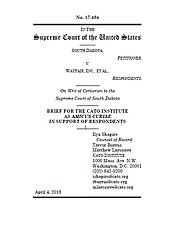Learn more about Cato’s Amicus Briefs Program.
Despite over a century of Supreme Court decisions holding that a state cannot force wholly out-of-state entities to collect taxes for them, South Dakota wants to do just that. In 2017, South Dakota passed Senate Bill 106, which attempts to force out-of-state sellers that ship to South Dakota residents to collect and remit South Dakota’s sales tax. The law is in direct contravention to the 1992 case of Quill Corp. v. North Dakota, which held that states could not compel any entity to collect taxes unless the entity has a physical presence within the state. South Dakota sued Wayfair, a popular home goods vendor, among other retailers, in an attempt to enforce their law and overturn Quill in the process.
South Dakota’s law is at odds with the Constitution. Quill’s physical-presence requirement stemmed from decades of developments in tax law that struck an important balance between due process and the Commerce Clause of our Constitution. Due process requires some definite link—some minimum contacts—between the state and any person, property, or transaction that a state seeks to tax or regulate. Wayfair does not own property in South Dakota, elects no representatives in South Dakota, and was afforded no protection by South Dakota’s police. South Dakota’s only justification for binding a foreign entity to its law is that some of Wayfair’s many customers happen to live there. To allow South Dakota to compel Wayfair’s collection of its state taxes raises serious concerns of taxation without representation. If states can directly compel people who live outside state boundaries to adhere to state standards—standards the people had no chance to influence—the concept of statehood itself is undermined.
Cato has filed an amicus brief in support of Wayfair, because, as the Supreme Court once said, it is a “principle of universal application, recognized in all civilized states, that the statutes of one state have…no force or effect in another.” A federal constitutional structure inevitably poses difficulties like South Dakota is experiencing, especially where trade is flowing freely between states. South Dakota may have to think of other ways to raise revenue, but that is not a justification for undermining our constitutional structure. Governments around the world are prone to complain about the difficulties of collecting taxes, but our Constitution was not written to bend to the states’ desires to raise revenue.



